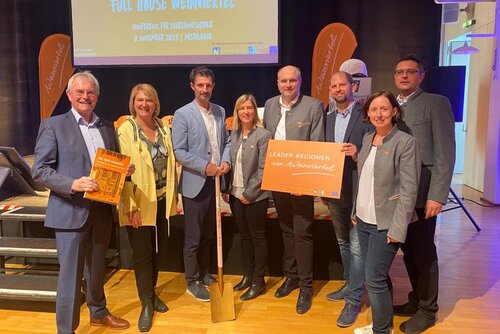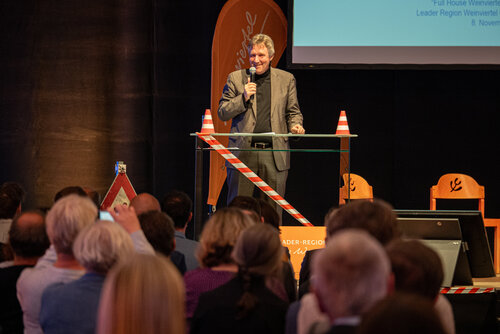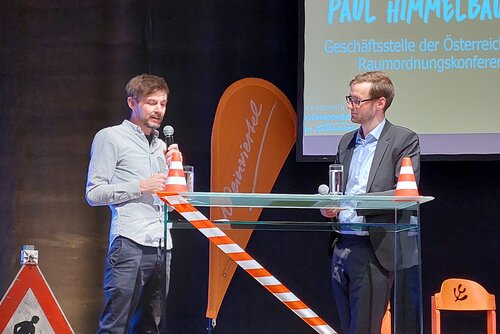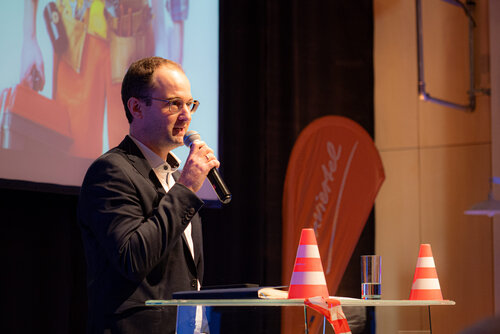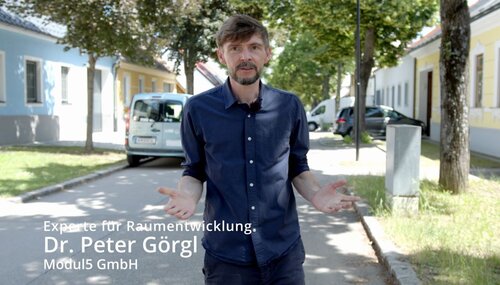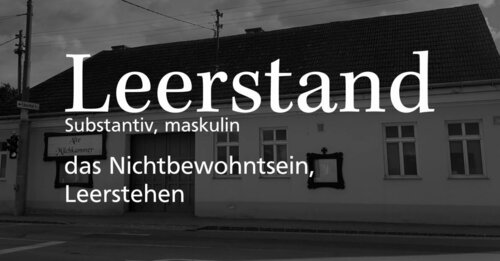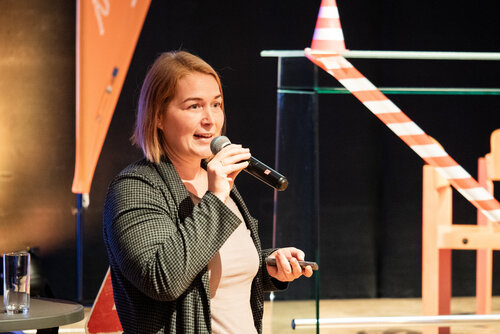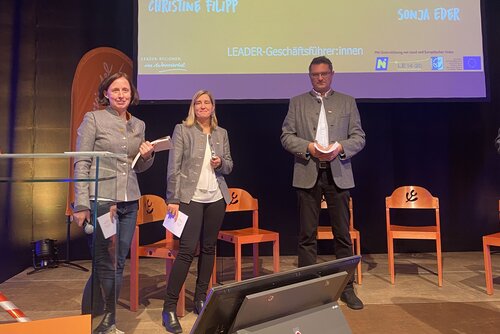Conference on vacant property management held on 8 November 2023
A glance at the many villages and towns in the Weinviertel region highlights that vacant properties are a widespread indicator of change. Vacancy rates are spreading throughout the suburbs of Vienna and nearby communities, affecting buildings both in the centre and outskirts. High vacancy rates aren’t a phenomenon limited to the Weinviertel region but a pan-European result of transforming lifestyles in society. In response, we need to raise renewed and stronger awareness for vibrant locations and the potential offered by vacant properties. We launched the Full House Weinviertel initiative based on this approach. We are enriching vacant properties with live and using examples to demonstrate how full houses can be achieved. The conference on vacant property management has launched a discussions that will have a far-reaching in the communities of the Weinviertel and beyond
Download: Inspiration for movers and shakers
"What do land use, greenfield development, building land reserves and
vacant properties have to do with the municipal budget?“
Keynote speech by Johann Bröthaler, Vienna University of Technology
During his keynote speech, Johann Bröthaler from Vienna University of Technology uncovered the long-term costs involved in land use planning. The way in which land is utilised (uncontrolled development/brownfield development) directly affects municipal production costs. Building land reserves costs money, just like vacant properties. It can often be difficult to estimate fiscal implications, which primarily rely on immigration/emigration, mobility and the job market. Careful consideration of short-term incentives and long-term costs is crucial for sustainable development. Click here to read the handout
„Overview of national vacant property management in AustriA“
Paul Himmelbauer, Austrian Conference on Spatial Planning, in discussion with Peter Görgl, Modul5
During the discussion between Görgl (Modul5) and Himmelbauer (ÖROK), the two experts look at which funding programs are already available and where there is space for further projects in the funding environment. Special attention was given to redeveloping town centres, tax incentives for business transfers and repurchasing operations due to changes in tax legislation. Municipalities need to continue playing an active role and tackling these issues on an ongoing basis. Click here to read the handout
Public sector impetus for vacant property management
Upper Austrian action plan for the revitalisation of vacant and derelict land, town and city centres – a case study.
Christoph Artner-Sulzer, regional management for Upper Austria, focused on the reduced amount of space and improvements to the town centre in Vorchdorf. The Upper Austrian action plan commits 32 million euros in funding for building revitalising, focusing on close cooperation and regional commitment. Click here to read the handout
Vacant properties as an opportunity for construction practices “, – a number of examples of best practices in the field of architecture in Lower Austria.
Petra Eichlinger, Niederösterreich GESTALTE(N), Lower Austria Building Department, discussed successful examples of reutilised vacant buildings. High vacancy rates affect both urban and rural areas. Thinking outside the box and partnering up with others permits conducive reutilisation and promotes good construction practices. Click here to read the handout
"An interplay of forces", key factors for municipal and regional development work with a strategic impulse from the Eisenstraße in Lower Austria.
In his presentation, Stefan Hackl from the municipality of Waidhofen/Ybbs highlighted the importance of networking, partnership and learning from successful case studies. To him, clearly defined strategies and proactive regional development are key. Taking different approaches, open communications and interdisciplinary learning also play an important role. Click here to read the handout
„The 3-pillar model for property activation"– gain insight into the mechanisms of successful intermunicipal partnership in Lower Franconia (Bavaria).
Wolfgang Borst, Chairman of the Hofheimer Land Municipal Alliance, discusses the 3-pillar model for property activation in Lower Franconia. The model is designed to eliminate vacant properties, avoid future vacant properties and strengthen the sense of community. One principle involves ensuring new construction costs in town centres do not go up. Conducting surveys on vacant properties at an early stage is crucial when it comes to taking effective action against vacant properties. ‘Owning vacant property should be a burden!’ Click here to read the handout
Summary and presentation of activation theses
In his summary, Peter Görgl highlights the cost involved in vacant properties and calls for the establishment of a legal framework. He views cultural initiatives and co-working spaces as incentives to reduce the number of vacant properties, including across municipalities. According to Görgl, introducing long-term measures is crucial. Raising awareness by addressing vacant properties, for example, is also important. Görgl makes sure to highlight the differences between property vacancies due to structural, haphazard, political and nostalgic reasons. Owners should be aware of their responsibility. Initiatives from mayors and local councillors are required to tackle vacancy rates.
Video introduction to the “Full House Weinviertel” initiativE
This introductory film was produced in partnership with ohne.media as part of the LEADER project Vacant Property Management in the Weinviertel. The film covers vacant building projects such as the former dairy in Ladendorf, ‘Working in the village’ in Niederkreuzstetten and the gymnastics project in Gänserndorf. The film demonstrates a number of positive ways to handle vacant properties, serving as inspiration for future projects.Film ab…
“Here’s how well things can go!” Reports from successful projects
’Working in the village – a case study regarding the redevelopment of a vacant property with commercial reutilisation by young entrepreneurs in Niederkreuzstetten.
Andrea Gepp, local councillor and project initiator, discusses improving quality of life in the village. She helped with the conversion of a former residential building in the village centre into a co-working space to give women the opportunity to work in their profession in the village. Now, a number of new services (e.g. a hairdresser, a midwife, etc.) are available in the village, helping not only self-employed women, but the local population. Click here to read the handout
’Letting without the risk’ – case study on the active support provided to property owners for letting vacant properties in Vorarlberg with minimal risk.
Rudolf Erath, Vorarlberg Provincial Government, discusses a project that addresses the refugee crisis and the lack of affordable housing. The project helps landlords with renovation work and finding tenants. Rents are capped and rented vacant properties contribute to CO² savings. Vacant properties are reactivated as a result. Click here to read the handout
„Tools for activating vacant property“, a case study for a tried and tested set of funding mechanisms that has resulted in over 300 property activations in Bavaria-Lower Franconia to date.
Philipp Lurz, ILE implementation facilitator of the Hofheimer Land municipal alliance, presents case studies to demonstrate a successful set of funding mechanisms for activating vacant properties, emphasises the importance of raising awareness of impending vacant properties, offers free planning advice, personal contact and plays the role of an insightful coordinator in rural areas. Click here to read the handout
„Gründung findet Stadt“, a case study on how supporting start-ups can lead to the activation of empty business premises.
Bettina Rehwald, Eisenstraße Niederösterreich, presents the LEADER project ‘Gründung findet Stadt’, which reduces the amount of vacant properties in town centres and supports start-ups. The project helps entrepreneurs find business premises, provides advice from riz up and the Lower Austrian Chamber of Commerce, offers financial support of up to EUR 7,500, free public relations work and has created over 60 jobs in its 26 months of existence. Find out more at https://www.gruendungfindetstadt.at/. Click here to read the handout
‘Here’s how well things can go’ discussion round with all vacant property management workers in a speed dating format
In-depth one-on-one discussions and four workshops
New concepts for old spaces and the options available to municipalities were discussed at the stations. The four workshops addressed topics such as costs, fees, funding models, refurbishment and construction advice and assistance available for letting and temporary occupancy. Emphasis was placed on the importance of agents who are familiar with the area and the municipality and can act as a middleman between owners and interested parties.
Topic 1: Agents are key players when working with vacant properties!
Topic 2: The first step towards change made easy!
Topic 3: Municipalities won’t accept vacant properties and owners are stepping up!
Topic 4: New concepts for old spaces!
Closing statement
In their closing statement, the three LEADER managers Christine Filipp, Sonja Eder and Markus Weindl outlined the basic principles and tools that have already been developed as part of the LEADER project. They also took a look at what is still to come; guests can look forward to informative discussion evenings and a trip to a vacant property. More information can be found on the LEADER website.
’Tackling vacant properties together! The LEADER regions want to partner up with the municipalities to ensure full houses in the Weinviertel region!’


